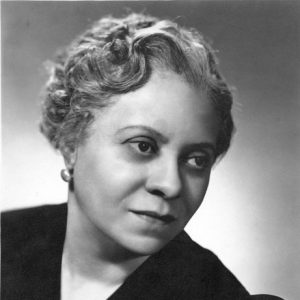calsfoundation@cals.org
Florence Price (1887–1953)
Florence Beatrice Smith Price was the first African American woman composer to have a symphonic composition performed by a major American symphony orchestra. The Chicago Symphony Orchestra performed her Symphony in E Minor on June 15, 1933, under the direction of Frederick Stock. The work was later performed at the Chicago World’s Fair as part of the Century of Progress Exhibition.
Florence Smith was born in Little Rock (Pulaski County) on April 9, 1887, to James H. Smith and Florence Gulliver Smith. Her father was a dentist in Little Rock (and author of the novel Maudelle), while her mother taught piano and worked as a schoolteacher and a businesswoman.
As a child, Smith received musical instruction from her mother, and she published musical pieces while in high school. She attended Capital Hill School in Little Rock, graduating as valedictorian in 1902. Smith waited a year and then enrolled at the New England Conservatory of Music in Boston, Massachusetts, which was a notable achievement for a Black woman at that time. In 1906, she received degrees as an organist and as a piano teacher.
After graduation, Smith returned to Arkansas to teach music at the Cotton Plant Academy in Cotton Plant (Woodruff County). She left Cotton Plant after only one year, however, to teach at Shorter College in North Little Rock (Pulaski County), where she remained until 1910. In that year, however, Smith moved to Atlanta, Georgia, where she was head of the music department at Clark University until 1912.
Smith returned to Little Rock in 1912 to marry attorney Thomas Jewell Price on September 25, 1912. The couple had two daughters and one son, who died in infancy. Her husband worked with Scipio Jones, a noted attorney who successfully defended the appeals of twelve Black men sentenced to death in the aftermath of the Elaine Massacre of 1919 in Phillips County.
While in Little Rock, Price established a music studio, taught piano lessons, and wrote short pieces for piano. Despite her credentials, she was denied membership into the Arkansas State Music Teachers Association because of her race.
Worsening racial tensions in Arkansas in the 1920s convinced the Prices to move to Chicago, Illinois, in 1927. There, Price seemed to have more professional opportunity for growth despite the breakdown and eventual dissolution of her marriage. She pursued further musical studies at the American Conservatory of Music and Chicago Musical College and established herself in the Chicago area as a teacher, pianist, and organist. In 1928, G. Schirmer, a major publishing firm, accepted for publication Price’s At the Cotton Gin. In 1932, Price won multiple awards in competitions sponsored by the Rodman Wanamaker Foundation for her Piano Sonata in E Minor, a large-scale work in three movements, and her more important work, Symphony in E Minor.
The latter work premiered with the Chicago Symphony Orchestra on June 15, 1933, and the orchestras of Detroit, Michigan; Pittsburgh, Pennsylvania; and Brooklyn, New York, performed subsequent symphonic works by Price. This was the first time a Black woman had presented her work on such a stage. In this regard, Price shared similar accomplishments with fellow Black composers William Grant Still and William Dawson, whose works were performed by leading orchestras in the 1930s and 1940s. Price’s art songs and spiritual arrangements were frequently performed by well-known artists of the day. For example, contralto Marian Anderson featured Price’s spiritual arrangement My Soul’s Been Anchored in de Lord in her famous performance on the steps of the Lincoln Memorial in Washington DC on Easter Sunday, April 9, 1939. European orchestras later played Price’s works.
This national and international recognition made her more popular back home, and in 1935, the Alumni Association of Philander Smith College in Little Rock sponsored Price’s return to Arkansas, billing her as “noted musician of Chicago” and presenting her in a concert of her own compositions at Dunbar High School.
In her lifetime, Price composed more than 300 works, ranging from small teaching pieces for piano to large-scale compositions such as symphonies and concertos, as well as instrumental chamber music, vocal compositions, and music for radio. Her musical style is a mixture of classical European music and the sounds of Black spirituals, especially the rhythms associated with African heritage, such as the juba dance. Price’s southern heritage had an obvious impact on her work, as the titles for some of her shorter works suggest: Arkansas Jitter, Bayou Dance, and Dance of the Cotton Blossoms.
Florence B. Price died in Chicago on June 3, 1953, while planning a trip to Europe. In 1964, a Chicago elementary school took her name as its own in recognition of her legacy as both a Chicago musician and an important Black composer. In 2018, she was inducted into both the Arkansas Women’s Hall of Fame and the Arkansas Black Hall of Fame and honored by the Arkansas State Music Teachers Association, which had denied her membership while she lived in the state.
In 2009, during renovations of an abandoned house in Illinois, the new owners of the home discovered piles of musical manuscripts, books, and various documents belonging to Price, who had used the house as a summer home. The owners contacted librarians at the University of Arkansas in Fayetteville (Washington County), where some of Price’s papers were already archived. The new materials contained many Price scores that had been presumed lost. Two of the works, the Violin Concertos Nos. 1 and 2, were recorded in 2017 for release in 2018 by the Albany label, with violin soloist Er-Gene Kahng of the University of Arkansas. G. Schirmer acquired the rights to Price’s scores and began publishing editions of a variety of repertoire, including her solo piano music and a new edition of her Piano Concerto Number 1. The first international festival dedicated to Florence Price’s music, PriceFest, was held (virtually, due to COVID-19) in Washington DC in August 2020. The Arkansas Symphony Orchestra released, in 2022 in advance of the 135th year since her birth in Little Rock, a recording of Price’s Concerto in One Movement. That same year, the auditorium at Paul Laurence Dunbar High School was named in honor of Price. In 2024, Azica Records released Beyond the Years: Unpublished Songs of Florence Price, while Hyperion Records released, the following year, Dvořák & Price: Piano Quintets.
For additional information:
Baranello, Micaela. “Welcoming a Black Female Composer Into the Canon. Finally.” New York Times, February 9, 2018. Online at https://www.nytimes.com/2018/02/09/arts/music/florence-price-arkansas-symphony-concerto.html (accessed April 5, 2021).
Brown, Rae Linda. “Florence B. Price, 1887–1953.” In Women Composers: Music through the Ages, Vol. 7: Composers Born 1800–1899, Vocal Music, edited by Sylvia Glickman and Martha Furman Schleifer. New Haven, CT: G. K. Hall, 2003.
———. “Florence B. Price’s Negro Symphony.” In Temples for Tomorrow: Looking Back at the Harlem Renaissance, edited by Geneviève Fabre and Michel Feith. Bloomington: Indiana University Press, 2001.
———. The Heart of a Woman: The Life and Music of Florence B. Price. Urbana: University of Illinois Press, 2020.
———. “Selected Orchestral Music of Florence B. Price (1888–1953) in the Context of Her Life and Work.” PhD diss., Yale University, 1987.
Brown, Rae Linda, and Wayne Shirley, eds. Florence Price: Symphonies Nos. 1 and 3. Middleton, WI: American Musicological Society, 2008.
Carter, Marquese. “The Poet and Her Songs: Analyzing the Art Songs of Florence B. Price.” DMus diss., Indiana University, 2018.
Ege, Samantha. “Chicago, the ‘City We Love to Call Home!’: Intersectionality, Narrative, and Locale in the Music of Florence Beatrice Price and Theodora Sturkow Ryder.” American Music 39 (Spring 2021): 1–40
Ege, Samantha, and Douglas Shadle. “Still Emerging, Decades On.” New York Times, April 9, 2023, p. 9AR. Online at https://www.nytimes.com/2023/04/07/arts/music/florence-price-music.html (accessed April 12, 2023).
Farina, William. Florence Price: The Life, Compositions and Influence of a Black American Composer. Jefferson, NC: McFarland, 2024.
Farrah, Scott David. “Signifyin(g): A Semiotic Analysis of Symphonic Worlds by William Grant Still, William Levi Dawson, and Florence B. Price.” PhD diss., Florida State University, 2007.
Florence Beatrice Smith Price Papers. Special Collections. University of Arkansas Libraries, Fayetteville, Arkansas. Selections online at http://digitalcollections.uark.edu/cdm/landingpage/collection/p17212coll3 (accessed April 5, 2021).
Harrison, Eric. E. “New Album of Unpublished Songs Continues Florence Price’s ‘Boom.'” Arkansas Democrat-Gazette, September 15, 2024, pp. 1E, 3E. Online at https://www.arkansasonline.com/news/2024/sep/14/new-album-of-unpublished-songs-continues-florence/ (accessed September 16, 2024).
———. “Performance beyond Price.” Arkansas Democrat-Gazette, April 3, 2022, pp. 1E, 3E. Online at https://www.arkansasonline.com/news/2022/apr/03/performance-beyond-price/ (accessed April 4, 2022).
Hartsough, Adrian Austin. “A Corpus Study of the Sonata-Form Works of Florence Beatrice Price.” PhD diss., University of Kansas, 2024.
Holiday, Harmony. “The Missing Black Notes: On Florence Price’s Mississippi River Suite.” Oxford American 111 (Winter 2020): 108–111.
Holzer, Linda. “Selected Solo Piano Music of Florence B. Price (1887–1953).” DMus diss., Florida State University, 1995.
———. “This Is What Diversity Sounds Like.” Clavier Companion 10, no. 6 (Nov./Dec. 2018).
Hudgins, Mary D. “Chicago School Named for State Composer.” Arkansas Gazette, June 30, 1968, p. 5E.
Hunter, Daniel Joseph, Jr. “Florence B. Price’s Compositional Style to Song Settings of Paul Laurence Dunbar’s Dialect Poetry: A Performance Guide.” DMA thesis, University of Nevada, Las Vegas, 2019.
International Florence Price Festival. https://www.pricefest.org/ (accessed March 30, 2022).
Jackson, Barbara Garvey. “Florence Price, Composer.” Black Perspective in Music 5 (Spring 1977): 30–43.
Knight, Ellen. “Florence Price: The Story of America’s Forgotten Musical Genius.” Al Jazeera, October 28, 2020. https://www.aljazeera.com/features/2020/10/28/florence-price-americas-lost-musical-genius (accessed April 5, 2021).
Peebles, Sarah Louise. “The Use of the Spiritual in the Piano Works of Two African-American Women Composers—Florence B. Price and Margaret Bonds.” PhD diss., University of Mississippi, 2008.
Ross, Alex. “The Rediscovery of Florence Price: How an African-American composer’s works were saved from destruction.” New Yorker, February 5, 2018. Online at https://www.newyorker.com/magazine/2018/02/05/the-rediscovery-of-florence-price (accessed April 5, 2021).
Shadle, Doug. “What I Wish Everyone Knew About Florence Price.” The Classical Alternative, March 19, 2020. https://classicalalternative.substack.com/p/what-i-wish-everyone-knew-about-florence (accessed April 5, 2021).
Smith, Bethany Jo. “Song to the Dark Virgin: Race and Gender in Five Art Songs of Florence B. Price.” PhD diss., University of Cincinnati, 2007.
Dan Dykema
Southern Arkansas University









Comments
No comments on this entry yet.